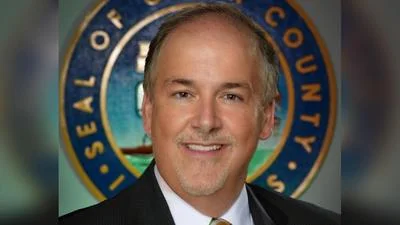Oak Park Village Trustee Jim Dodge | Facebook
Oak Park Village Trustee Jim Dodge | Facebook
Oak Park Village Trustee Jim Dodge can’t see any good coming from the new vaccine passport mandate recently instituted for Cook County.
“I think checking for vaccinations, now that we know what we know about transmission, I don’t know what good it accomplishes,” Dodge told the Prairie State Wire. “All these units of government haven’t made a clear case of how that helps. I’ve been to a couple of places that check for vaccinations and some do it closely and some don’t. I think it's just people out there checking the box. It's not clear this is an effective thing to do. I don’t think anybody, anywhere thinks government has convinced enough of us that all these mandates are working.”
While with the Centers for Disease Control and Prevention having established that anyone, regardless of vaccination status, can likely spread the omicron variant of the coronavirus to other people and the variant likely will spread more easily than the original SARS-CoV-2 virus, Dodge said he can see why many still remain hesitant to taking the vaccine.
“The big failing for government is they haven’t been honest with us about what they’re trying to accomplish and if what they're doing works,” he said. “People shrug because government clearly does not have an answer.”
Dodge said he still can’t figure out why Mayor Lori Lightfoot would be taking cues from New York City officials in enacting the passports when they are seen by many as having failed there.
“I'm not sure,” he said. “Sometimes in government the bias is to do something as opposed to just standing still. I think at its core there is a motivation to do something helpful, but the fundamental challenge still is does it work?”
Dodge said he sees himself continuing to support businesses across the state that do not support the mandate.
“For a small business trying to survive in the face of rules constantly changing and mandates that haven’t proven to work, I have no problem supporting them,” he said.
Dodge said his biggest worry is how much the ongoing mandates figure to continue impacting the state as a whole.
“If you’re unhappy or dissatisfied with being overtaxed and underserved, this is another log on the fire when it comes to making the decision to vote with your feet,” he said. You look at the impact all the disruption has had on society and you have a hard time saying hard lockdowns did anything truly positive at any point.”
Dodge argues government officials have the needs of the health care system in mind.
"Now, what we've all seen is courts have been deferential because it’s a public health crisis,” he said. “We know a lot more now about the virus, so you can make an argument this has always been about trying not to overload the health care system.”
Wirepoints president Ted Dabrowski recently told WXAN radio host Will Stephens the state continues to lose much of its appeal in the eyes of many of its former residents, including record population losses of 114,000 people in 2021.
Dabrowski explained that the measure of population loss is meaningful because it captures all of the factors affecting the quality of life in Illinois: taxes, pandemic mandates, crime rates, finances and family values.
“What we see in Illinois is a sad continuation of people fleeing the state. It’s a scary measure that people, in the end, can’t find their opportunities here,” he said. “Politicians will talk about the problems we have in Illinois, but they don’t blame the right things and they certainly don’t call for action to fix the right things. That’s why we perpetuate the losses.”
Since the pandemic hit, the Chicago Tribune recently placed the number of businesses that have been forced to close at 4,400, including 2,400 that say they won’t reopen. Using data from crowd-sourced business review platform Yelp, researchers said across the country more than 132,500 businesses have permanently or temporarily closed since March, with Chicago being home to the fourth-highest number of closures, behind only Los Angeles, New York City and San Francisco.
Restaurants and retail have been the hardest-hit sectors in the Chicago area, with more than 800 restaurants and 700 retail businesses having closed their doors since March 1. More than 550 of those restaurants and 420 of those retailers will not reopen.
“These small businesses are really hurting,” said Illinois Retail Merchants Association vice president Tanya Triche. “The impact is real. You may not see a closed sign on the business, but that doesn’t mean that they’re not in trouble.”






 Alerts Sign-up
Alerts Sign-up